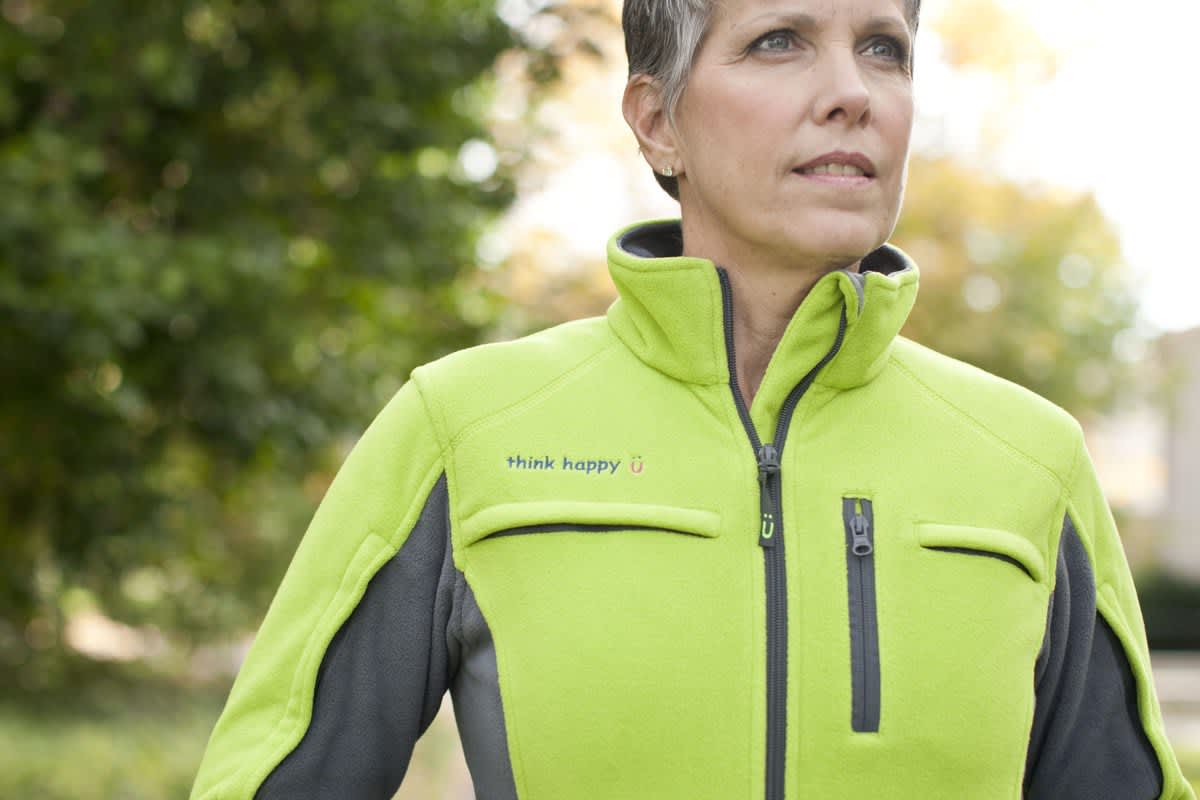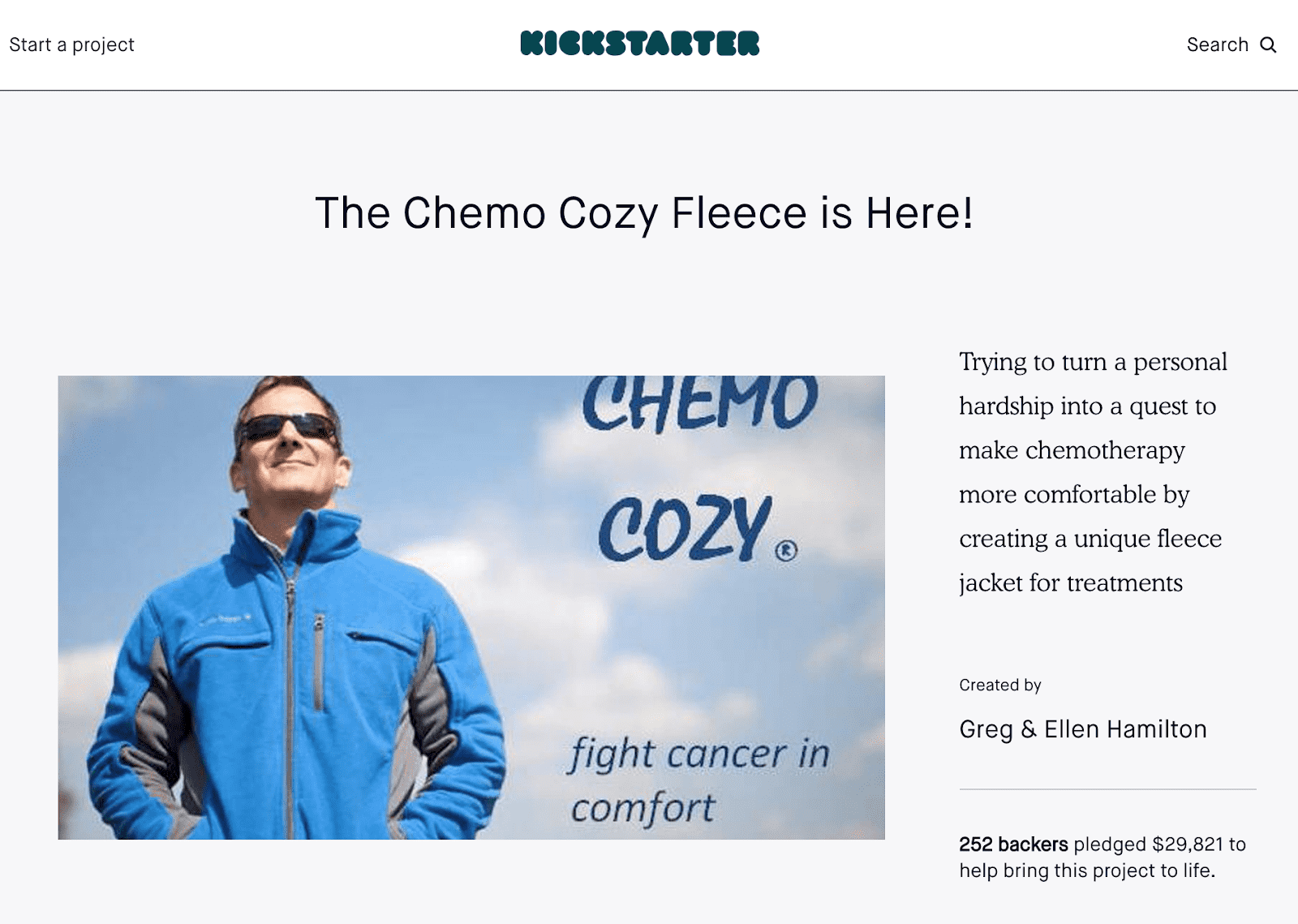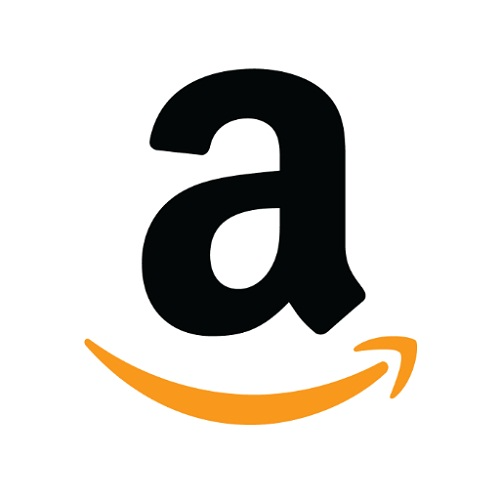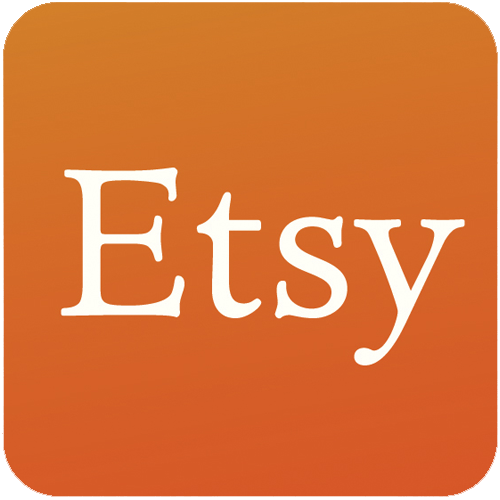Creating A Clothing Brand That Supports Patients Fighting Cancer
Hello! Who are you and what are you working on?
Hi! My name is Ellen Hamilton and I’m a Founder and CEO of Chemo Cozy; a company that makes fashionable and functional apparel designed to provide warmth and comfort to patients during infusion treatments.
Our signature product is our fleece jacket. This jacket was designed specifically to help patients have a better experience while being treated. The fleeces are not only are functional (providing staff easy access to port or PICC line sites) they are also very comfortable, warm and stylish. Additionally, they help alleviate some of the pre-existing anxiety related to battling cancer by preventing the patient from having to practically disrobe in order to gain access to the infusion site.
Chemo Cozy launched with a Kickstarter campaign that raised 30k in 30 days! We operated out of our garage and a storage facility, handling all customer care and personally packing and shipping every order.
We now have customers in all 50 states and internationally and have three online stores- our website chemocozy.com, an Etsy shop, and now a store on Amazon.
What's your backstory and how did you come up with the idea?
The idea for Chemo Cozy was the result of my now late husband (and co-founder), Greg Hamilton’s chemotherapy experience.
Greg was diagnosed with cancer in 2010. His treatment included both radical surgeries and extensive chemotherapy. It was during his journey that we realized there was a need for more accessible and comfortable clothing specifically designed to provide patients a better experience during their treatments.
My advice for entrepreneurs who are just starting out is simple: make sure you have a mission. No matter what the product or service, figure out what your mission is and use that as your guide to moving forward.
We were able to directly validate our idea by connecting directly with infusion center and hospital staff that were administering the medicine, as well as many, many other patients going through treatment.
At the time of inception, Greg and I both had full-time jobs, medical bills, and four-year-old little boy. Once we got a prototype we were satisfied with, we knew we had to explore business loan options so that we could get the fleeces into the hands of patients who could really benefit from them.
Describe the process of designing, prototyping, and manufacturing the product.
The design process was quite an adventure, considering neither I nor Greg had experience in this area.
Creating a prototype
The very first fleece was actually one that I purchased at an outlet mall and brought home and cut holes into. A relative who was very skilled in sewing saw the fleece and asked us to get another one so she could make the same access points in a much more professional way :)
When Greg wore our homespun jacket into his treatments everyone (both staff and other patients) wanted to know where he got it. It was then that the idea for Chemo Cozy was born.
Manufacturing
We began to research US manufactures but no one was interested in producing a smaller order (500 of each color).
On the occasion that we were able to connect with someone nationally the cost to manufacture would prohibit us from making the fleeces, or we’d have to charge so much for them that it didn’t make sense -as our mission was to be able to get them to as many people who could benefit from them as possible.

We were given some contacts in the industry and were able to find a manufacturer in China that was reputable and willing to work with us to provide a quality product at a relatively reasonable cost. After many, many prototypes we were able to give the green light to start production. Our first run was 4000 garments!
We designed our “think happy” logo that is embroidered on each fleece as well as all of our marketing material, etc. We also began the process to obtain trademarks for zipper locations and well and our company name and the logo. We did every bit of it on our own! It was a true labor of love.
Describe the process of launching the online store/business.
In terms of launching the business, we first created a video for our Kickstarter campaign which we knew we could then use on our website.

Greg and I used a template from Shopify and began designing the site on our own. Not bad for two people who had no idea how to do any of that stuff! We left placeholders for product photos that we could populate once our initial order arrived from China.
We were able to use some of the prototypes to do some initial photos and we hired a photographer friend to help us with that. Our photographer had some experience with Shopify as well so she was able to help us with parts of the design if we came to a roadblock.
Our “rewards” for our Kickstarter campaign were the actual product. We timed the campaign so that it would end just in time for us to be able to make the final payment to get our things off the boat and delivered to our home. We packed well over 300 fleeces and shipped them! Shortly after the Kickstarter campaign ended we took our website chemocozy.com live.
We financed the business with the resources from our Kickstarter campaign, a business loan and, a little later, some investments from friends and family.
Initially, we had a good deal of customers as well received some great media attention. Everytime a story would air/be printed we’d see a bump in sales. Hospitals and foundations were also very interested in trying to provide the fleeces to their patients so we worked with them to augment our online sales.
If I had to give a “lessons learned” from the launch I’d say I wished we had done some larger pre-sales to larger institutions like hospitals, etc. to help fund some of our expenses during our early stages. I also would have tried some other marketing routes rather than a few that we chose to invest in. I think that finding a marketing consultant that would have done some pro bono work for us at the onset would have been a good idea. Perhaps someone with a personal connection to cancer who could have provided some good insight into where we might want to invest any marketing dollars during our launch.
Since launch, what has worked to attract and retain customers?
In terms of attracting and retaining customers, I’d say having more than one online shop is a great start. Adding an Amazon shop has been terrific for me. I haven’t run any ads or done anything other than launching the Amazon shop and I still saw a nice increase in sales.
I also find it interesting to see how the culture of the customer differs among my three shops! For instance, buyers on my website are often repeat customers who know exactly what they are looking for.
Amazon customers tend to buy quickly and may not look into the sizing chart/notes, etc. which can result in a fleece that’s too small or large...leading to a return and exchange.
Etsy customers often like to chat a bit prior to placing an order. I often have two or three communications with an Etsy buyer before they purchase.
I also suggest using social media for some marketing/advertising. I run ads now and again on FB by creating a target market and creating content that is relevant to a holiday, season, etc…
FB ads are relatively inexpensive and can provide a boost in sales. Additionally, getting followers to the FB page and strategic posts help keep the business ‘front of mind”. We have just over 3000 followers today.
SEO
Making sure we pop up in a google search is also imperative. Just by managing the SEO I saw a nice bump in initial sales. Utilizing specific keywords as often as we could was key to optimization. Chemo, Chemotherapy, infusion, cancer, cancer clothing, etc… Think of words you would use in a google search if you were shopping for your product and make sure they exist in the text on your site...as often as you can.
We’ve also done periodic newsletters. These are great to post and share with people who already have some familiarity with the product.
I don’t think they generate business, per se, but they are a nice way to reconnect with customers who may, in turn, pass the literature along to some else.
Twitter & Instagram
Twitter and Instagram have never worked for me..and they are more to manage. I’ve had interns that really focused on all of the social media and the only avenue that has really been successful in terms of any revenue has been FB.
I realized my efforts were better spent reaching out to hospitals, gift shops, etc.
Press
Lastly, any press that highlights the company is GREAT for business! News channels, magazine features, anything of that nature...
How are you doing today and what does the future look like?
Today, Chemo Cozy is looking good business-wise! I have enough revenue to order more product and take care of all expenses without having to utilize any outside funding (loans, etc.) I don’t currently do extensive marketing but that will ramp up as we head into the fall/winter season.
Most of my sales are online (Amazon and Shopify are usually just about even in terms of monthly revenue and Etsy is a small portion of the total) Additionally, I sell directly to hospitals, infusion centers, and gift shops at a reduced price so my profit margins are a little lower there, but the quantities are higher. For example, I just processed a 40 piece order for an infusion center in Florida. The revenue from that one order is worth almost 2 weeks of online sales (which are most often one fleece per order)
My biggest initiative right now is trying to find a US-based manufacturer. I am currently working with a company based in CA on a prototype. If all goes well, they will take over the fleece production. Fingers crossed! This would allow me to aggressively market to new venues and, if I see more success with larger orders, my turnaround time would be much faster than the current four-month wait for the product to arrive from China.
I also have some plans for additional products. If this manufacturer is viable I can use them throughout my design process, etc. Very exciting!
Through starting the business, have you learned anything particularly helpful or advantageous?
I certainly have learned a lot through starting Chemo Cozy.
One of the standouts for me was realizing that I needed to find and utilize any resources available to me. I think initially we chased our tail a bit by trying to figure out everything on our own (business plan, LLC formation, website design, import/export laws, etc…).
There are plenty of resources that are free that would have been useful to us, especially early on. We were part of a wonderful foundation that supports entrepreneurs who start businesses with a social mission (profit or non-profit) that has a wealth of resources for participants to take advantage of. While I did work closely with them the past couple of years, engaging with them early probably would have been helpful.
Personally, I learned that I needed to know how EVERY single part of the business operated. My late husband and I started Chemo Cozy together. It was a labor of love and we were very passionate about making a great product that would help others.
He did most of the legal “stuff” and built the website, etc. while I did a lot of work with getting our Kickstarter campaign and social media going as well as connecting with foundations and hospitals that could be potential partners.
When my husband passed away quite suddenly in late 2015, I was scrambling. I didn’t know how to manage the website or make edits, wasn’t as savvy with the shipping process (we used to do all of the shipping ourselves!) and hadn’t engaged much with the people at the warehouse where our goods were stored.
In hindsight, I would have made sure I had a good handle on everything right from the beginning. My customers never knew I was scrambling as my first priority was to make sure there were no hiccups in service. I handled their needs first, then figured everything else out as I moved forward.
What platform/tools do you use for your business?
My favorite tool for promoting business is a Facebook ad campaign. They are generally successful when crafted in a way that showcases the product at work. I think because my product often times has such a personal connection to either the person who is viewing the ad or to someone they know that has/has had cancer, utilizing photos and displaying the fleece in a positive light, is most appropriate as it directly supports our mission of wanting people to look and feel better and to try and “think happy”!
I have promoted products via Shopify and just started to work on incorporating Shipstation now that I have three online sales platforms. I’ve also used MailChimp to connect with past customers and to send out the Chemo Cozy newsletter. Also USPS mobile.
I LOVE the apps for each of the shops. The Shopify, Amazon and Etsy apps are all great and allow me to manage business very effectively from anywhere. I can quickly respond to customer needs and make sure that they are well taken care of.
Often my customers may be sick or anxious about starting chemotherapy, or they may be a worried family member of the person going through treatment and trying to do something to help by ordering a fleece. I am so hyper-aware of that and the last thing I want is for them to have any issues ordering a fleece! Having the apps allows me to immediately see all communications, orders, etc and respond quickly.
What have been the most influential books, podcasts, or other resources?
My biggest influences are my customers. They are my inspiration. They write to me, leave me messages, and include the most beautiful gift notes (if they aren’t the ones going through treatment but are sending the fleece as a gift).
When I speak to a staff member at an infusion center who wants to try and figure out a way to get the fleeces for all of their patients, or a former patient who wore one of the fleeces during their own treatment and now wants to donate to others it validates my work and makes any challenges I encounter all worth it.
They think we are so wonderful for designing and making the fleece that helped them have a more comfortable experience during their treatment but really, they are the amazing ones.
Advice for other entrepreneurs who want to get started or are just starting out?
My advice for entrepreneurs who are just starting out is simple: make sure you have a mission. No matter what the product or service, figure out what your mission is and use that as your guide to moving forward.
Is your mission to simply invent a product that you think will help you make a lot of money? Great..what about the product/service makes it unique/special? Why is it important. Can it help people? Think about WHY you are doing what you are doing and write it down. Keep it in your office or as a screensaver on your laptop/smartphone. Look at it when you hit a roadblock at 2 am and you are exhausted.
Most products/services are created when I void/need is recognized. We then work to create something to fill that need. Ask yourself what filling that void/need will do for your customers. Will it help make their life easier in some way? Think about why you want to do whatever it is you are doing and don’t lose sight of it!
Are you looking to hire for certain positions right now?
Currently, I am not looking to hire anyone but once I make some final decisions on a new manufacturer I plan to look for some part-time marketing help, and perhaps a contract position to make some changes to the website.
Where can we go to learn more?
chemocozy.com, like us on FB (Chemo Cozy)
Email: ehamilton@chemocozy.com

Download the report and join our email newsletter packed with business ideas and money-making opportunities, backed by real-life case studies.

Download the report and join our email newsletter packed with business ideas and money-making opportunities, backed by real-life case studies.

Download the report and join our email newsletter packed with business ideas and money-making opportunities, backed by real-life case studies.

Download the report and join our email newsletter packed with business ideas and money-making opportunities, backed by real-life case studies.

Download the report and join our email newsletter packed with business ideas and money-making opportunities, backed by real-life case studies.

Download the report and join our email newsletter packed with business ideas and money-making opportunities, backed by real-life case studies.

Download the report and join our email newsletter packed with business ideas and money-making opportunities, backed by real-life case studies.

Download the report and join our email newsletter packed with business ideas and money-making opportunities, backed by real-life case studies.










